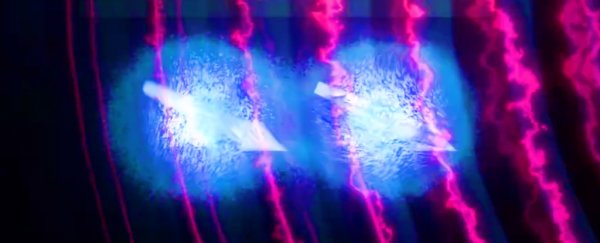Scientists have measured the accuracy of two-qubit operations for the first time in silicon, bringing the world a big step closer to reliable quantum computing.
The great promise of quantum computers is that they will enable a vastly more powerful and faster way of making calculations than the computing power we've had until now.
The theoretical foundation of how quantum computers will be able to do this is the qubit: much like the computers of today process information in binary bits that take either a 0 or 1 value, quantum computers depend on the related but superior concept of the qubit.
What makes qubits superior to conventional bits is that in addition to just occupying a 0 or 1 position, they can occupy both at the same time: what's known in quantum mechanics as the superposition.
Maintaining the qubits' superposition enables quantum computers to solve complex mathematical problems by running calculations based on the probability of an object's state before it is measured – but the systems can only deliver on their promise if qubit operations are themselves reliable.
"All quantum computations can be made up of one-qubit operations and two-qubit operations – they're the central building blocks of quantum computing," says nanoelectronics researcher Andrew Dzurak from the University of New South Wales (UNSW) in Australia.
"Once you've got those, you can perform any computation you want - but the accuracy of both operations needs to be very high."
In 2015, Dzurak and fellow researchers built the world's first quantum logic gate in silicon, so that two qubits could communicate with one another.
Other teams have accomplished this too since then, but up until now nobody knew what the fidelity (basically accuracy) of these systems were.
"Fidelity is a critical parameter which determines how viable a qubit technology is," explains quantum experimental engineer Henry Yang, also from UNSW.
"You can only tap into the tremendous power of quantum computing if the qubit operations are near perfect, with only tiny errors allowed."
In the new research, the team was able to refine the fidelity of their two-qubit logic gate to a threshold of up to 98 percent.
That the researchers were able to achieve this in silicon – the material commonly used for conventional computer chips – demonstrates that the same substance could also be used in future quantum computers one day, in far more powerful logic systems comprised of millions of qubits, the team suggests.
"Two-qubit fidelities reaching the required limits for fault-tolerance are therefore within reach and underpin silicon as a technology platform with good prospects for scalability to the large numbers of qubits needed for universal quantum computing," the authors explain in their paper.
Of course, it will take a lot more work to get to the point where larger sets of qubits are performing these complex calculations.
In recent years, scientists have only succeeded in getting relatively small amounts of qubits operating: things like IBM's 50-qubit machine, for example.
There's also the question of refining the fidelity even further, the researchers say, so that future silicon systems are even more reliable.
"If our fidelity value had been too low, it would have meant serious problems for the future of silicon quantum computing," Dzurak says.
"We think that we'll achieve significantly higher fidelities in the near future, opening the path to full-scale, fault-tolerant quantum computation"
The findings are reported in Nature.
